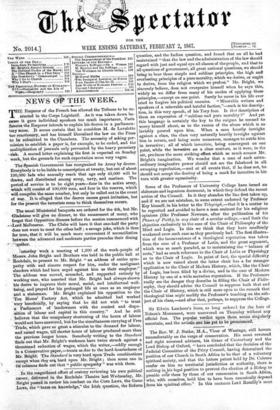'esterday week a meeting of 1,200 of the work-people of
Messrs. John Bright and Brothers was held in the public hall at Rochdale, to present to Mr. Bright " an address of entire sym- pathy with and sincere respect for him, under the malignant slanders which had been urged against him as their employer." The address was moved, seconded, and supported entirely by working men, who asserted that Mr. Bright had always shown his desire to improve their moral, social, and intellectual well- being, and prayed for his prolonged life at once as an employer and a statesman. Mr. Bright explained his opposition to the Ten Hours' Factory Act, which he admitted had worked very beneficially, by saying that be did not wish " to trust a Parliament of landowners with the control and dispo- sition of labour and capital in this country." And he still believes that the compulsory shortening of the hours of labour would not have answered, but for the simultaneous carrying of Free Trade, which gave so great a stimulus to the demand for labour, and raised wages, till shorter hours of labour produced more than the previous longer hours. Somebody writing to the Standard finds out that Mr. Bright's workmen have twice struck against a threatened reduction of wages, which the writer,—oddly enough in a Conservative paper,—treats as due to the hard-heartedness of Mr. Bright. The Standard is very hard upon Trade combinations except when they are, hard upon Mr. Bright ; then some one in its columns finds out that " public sympathy" was with them.


































